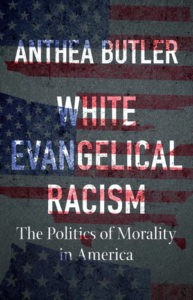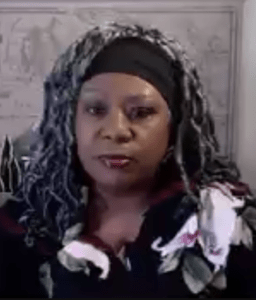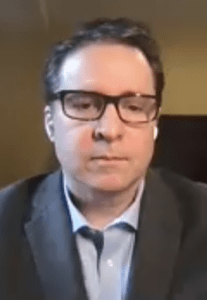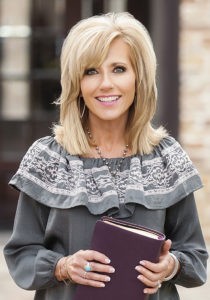White Christians must seek atonement before reconciliation if the wounds of racism are to be healed, two religion scholars said during a March 16 webinar on evangelicalism and race in America.
 “You can’t have change until you have had true repentance,” said Anthea Butler, author of the new book, White Evangelical Racism: The Politics of Morality in America. She spoke during the Zoom session hosted by Public Religion Research Institute.
“You can’t have change until you have had true repentance,” said Anthea Butler, author of the new book, White Evangelical Racism: The Politics of Morality in America. She spoke during the Zoom session hosted by Public Religion Research Institute.
She was joined during the webinar by PRRI founder and CEO Robert P. Jones, author of White Too Long: The Legacy of White Supremacy in American Christianity.
“White Christians need to stop reaching for reconciliation and start thinking about repair and repentance,” Jones said. “If we did enough repair and repentance, the reconciliation would take care of itself.”
In just over an hour, Butler and Jones fielded questions exploring the religious and cultural origins of American racism and the insidious ways these historically entrenched attitudes continue to manifest in controversies such as Confederate monuments and history, the presidency of Donald Trump and the ongoing debate about Critical Race Theory.
‘These patterns are still with us’
One of the challenges in studying how white evangelicalism and racism are enmeshed derives from the control white Christians have had over the writing of that history, said Butler, associate professor of religious and Africana studies at the University of Pennsylvania.

Anthea Butler
“Books from big evangelical men never deal with race or gender issues,” she said, explaining this fact partly inspired her new book. “It was clear to me that this is something we need.”
White Christians also have shaped Scripture and theology in their own image, Butler said. In Genesis, Noah’s son Ham is cursed for witnessing the nakedness of his father. The account was interpreted by whites to condone the slavery of African people.
Jones said he would add the “curse of Cain” to the mix. In the passage, also from Genesis, God marks Cain as a punishment for killing is brother. “White Christian clergy and scholars interpreted that as — ah-ha — the origin of non-white people in the world. And if you read the story that way, it’s not a far leap to a hierarchy of race and belief that people of color descended from an act of violence.”
The notorious Slave Bible, published for missionaries to use with slaves, was published without biblical passages depicting or condoning the freeing of slaves, including the Exodus narrative, Jones noted.
“It sounds fantastic,” he said. But “these patterns are still with us today.”
The Lost Cause
In part, such patterns live on through the belief that the Confederacy was a just and noble enterprise as promoted through the proliferation of Civil War monuments in the early 20th century.
The statues were typically placed in central public spaces and emblazoned with phrases such as “God will vindicate.” The sentiment driving the movement is known as the Lost Cause.

Robert Jones
“Even with the defeat in the Civil War, there was this belief that these values would live on, that the white supremacist hierarchy would live on, and that was enshrined in all these monuments across the country,” Jones said.
The connection to Christianity often was plain to see as white Christians opened churches near the monuments “to be literal brick-and-mortar witnesses to that Lost Cause sentiment,” he said.
Butler added that the Jan. 6 storming of the U.S. Capitol by Trump supporters effectively served as an expression of that spirit as well: “When you see a Confederate flag at the Capitol, you can understand how the religion of the Lost Cause is still with us today and still embedded in racism and religion.”
Despair driven by demographics
And the numbers bear that out, Jones said. PRRI created an index of racist attitudes among white religious groups. White evangelicals stood out with an 8 out of 10, with 10 being the most racist.
White mainline Christians and Catholics weren’t all that much lower, at 7. Only whites who are religiously unaffiliated were much further down the index, at 4.
The implications are clear, Jones said: “If you take your average white American and add Christianity, it moves them further up this racism index.”
The current crisis for white Christians is compounded by their continuing downward spiral in the U.S. population.
The current crisis for white Christians is compounded by their continuing downward spiral in the U.S. population, he added. Currently they make up 44% of the general population while white evangelicals have dropped to 15%.
Those trends, and heightened social unrest due to police brutality against Blacks, has led conservative Christians to lash out against ideas and movements such as Critical Race Theory, Jones and Butler explained. CRT seeks to examine the impact of historic racism on modern America life.
In November, the six white male presidents of the Southern Baptist Convention’s seminaries issued a statement declaring Critical Race Theory to be at odds with the denomination’s doctrinal statement.
“Why are we fighting over this now?” Jones asked. “It’s because the narrative is being threatened. … It is a defensive move to circle the wagons to protect white institutions and how they understand themselves.”
Relation to gender bias
White evangelicals are facing a similar challenge along the lines of gender, a fact hammered home by recent news that popular author and Bible study teacher Beth Moore had broken with the SBC.
 Moore had come under fire in the denomination for her criticism of Trump’s mistreatment of women and for her support of sexual abuse victims.
Moore had come under fire in the denomination for her criticism of Trump’s mistreatment of women and for her support of sexual abuse victims.
Moore “bucked male leadership” in the convention and violated the ideal of Southern white womanhood, Butler said. “She got a lot of flak.”
But Moore’s departure and the move against Critical Race Theory will spell trouble for the convention more than for women and Blacks, she predicted. “The SBC has to figure this out. Losing Beth Moore, losing Black pastors in the denomination. You just can’t be blatantly racist anymore and say you want to be in charge.”
Related articles:
SBC seminary presidents meet with Black pastors but don’t change position on Critical Race Theory


